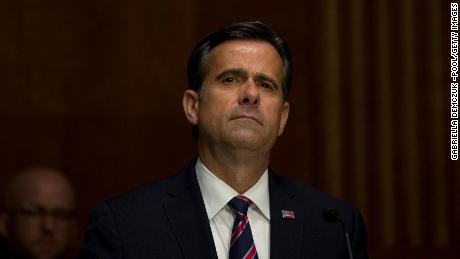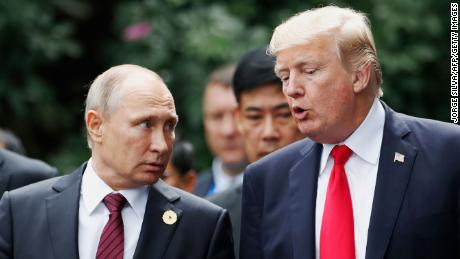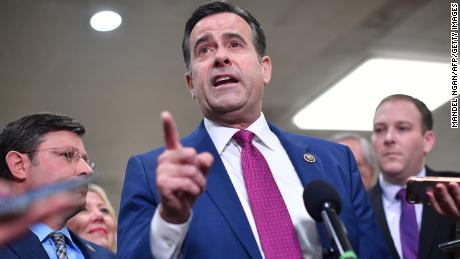Washington (CNN)The top US intelligence official released information Tuesday about unverified Russian intelligence about Hillary Clinton that will likely fuel President Donald Trump's attacks on the Russia investigation and Clinton's 2016 campaign.
Democrats charged that Director of National Intelligence John Ratcliffe was pushing Russian disinformation about Clinton, which Ratcliffe denied.
Ratcliffe declassified the summary of a Russian intelligence assessment of Clinton on Tuesday, writing that US intelligence in 2016 obtained a Russian intelligence analysis that alleged Clinton had approved a campaign plan to "stir up a scandal" against Trump by tying him to Russia and the hack of the Democratic National Committee. Ratcliffe wrote to Senate Judiciary Chairman Lindsey Graham, who released the summary, that the intelligence community "does not know the accuracy of this allegation or the extent to which the Russian intelligence analysis may reflect exaggeration or fabrication."
Ratcliffe's letter to Graham was the latest in a string of declassified documents Ratcliffe and Attorney General William Barr have provided to Senate Republicans and others targeting the FBI's Russia investigation ahead of the November election.
Democrats accused Ratcliffe, a former Republican congressman from Texas, of politicizing intelligence and trying to help Trump's campaign.
"It's very disturbing to me that 35 days before an election, the director of national intelligence would release unverified Russian 'rumint,'" said Sen. Mark Warner of Virginia, the top Democrat on the Senate Intelligence Committee, referring to an intelligence acronym for "rumored intelligence."
"DNI Ratcliffe is abusing his position exactly as I feared he would, and the abuse is accelerating as we near the election," said Sen. Ron Wyden, an Oregon Democrat on the Intelligence panel.
A Democratic congressional source said the Senate Intelligence Committee has previously examined the information Ratcliffe provided and determined that it was Russian disinformation.
Ratcliffe subsequently released a statement after Graham's release denying that the intelligence was disinformation. "To be clear, this is not Russian disinformation and has not been assessed as such by the Intelligence Community," Ratcliffe said. "I'll be briefing Congress on the sensitive sources and methods by which it was obtained in the coming days."
Graham defended the release of the Russian intelligence, arguing he wanted to know whether the FBI cared more about Trump disinformation and "looked at all things Trump," but did not do the same with Clinton.
"I don't know if it's true or not," Graham told CNN. "The question is did the FBI look at it when the Intelligence Community asked them to look at it? That's the only thing I care about. It may be true, it may not be true -- but did they look?"
Durham investigation unlikely to conclude before Election Day
The declassified releases from Ratcliffe and Barr have been frequently touted by Trump and his campaign, serving as fodder for conservatives who are frustrated that more hasn't come from US Attorney John Durham's investigation into the FBI's handling of the Russia investigation.
According to sources and Barr's own recent public comments, Durham's work is not expected to conclude before the election. That means that unless Barr can issue an interim report from Durham, a highly unusual move for an ongoing investigation, the recourse to make public some of the information that has been part of the Durham review is to turn it over to congressional Republicans who are eager to release it before the election.
The declassified summary, which does not include any underlying intelligence, comes just before Trump's first debate with former Vice President Joe Biden Tuesday evening and ahead of former FBI Director James Comey's testimony before Graham's committee on Wednesday. Ratcliffe wrote that former CIA Director John Brennan briefed President Barack Obama about the matter, and that US intelligence officials "forwarded an investigative referral" to Comey and Deputy Assistant Director of Counterintelligence Peter Strzok.
Former CIA officer John Sipher, who previously ran the agency's Russia operations, told CNN that the material released by Ratcliffe and Graham is likely Russian disinformation but ultimately, that does not matter.
"It's inappropriate to cherry pick and declassify specific pieces that seem to benefit the President. The public cannot put it in context even if it weren't a scam. It's pure politicization," he said.
Nick Shapiro, a former CIA deputy chief of staff to Brennan, said that "DNI Ratcliffe should be ashamed of his blatant politicization of his position," adding: "Russian interference in the election was real, intense, and unprecedented in scale and scope. It was authorized personally by Putin to hurt Secretary Clinton and to promote the electoral prospects of Donald Trump."
Nick Merrill, a spokesman for Clinton, said in a statement, "Lindsey Graham is full of s---."
Both Ratcliffe and Barr have declassified a trove of documents to Senate Republicans this year related to the FBI's Russia investigation, the prosecution of former Trump national security Michael Flynn and other matters, like "unmasking" requests during the end of the Obama administration that are a routine part of intelligence gathering.
Last week, Barr released documents that showed the FBI had investigated dossier author Christopher Steele's primary subsource for connections to Russian intelligence officials in 2009. Justice Department prosecutors in the past month also conducted and released notes from an interview with a former FBI case agent who's highly critical of the Russia investigation and the prosecution of Flynn ahead of Tuesday's court hearing on the Flynn case, which DOJ is trying to dismiss.
Flynn's lawyer, Sidney Powell, said Tuesday that she had recently discussed the case with Trump.
This story has been updated with additional reaction to the release.







